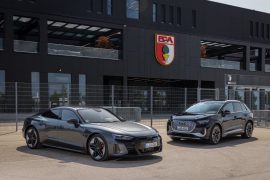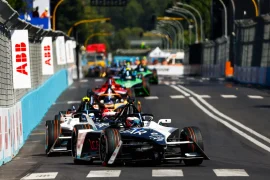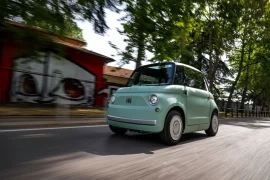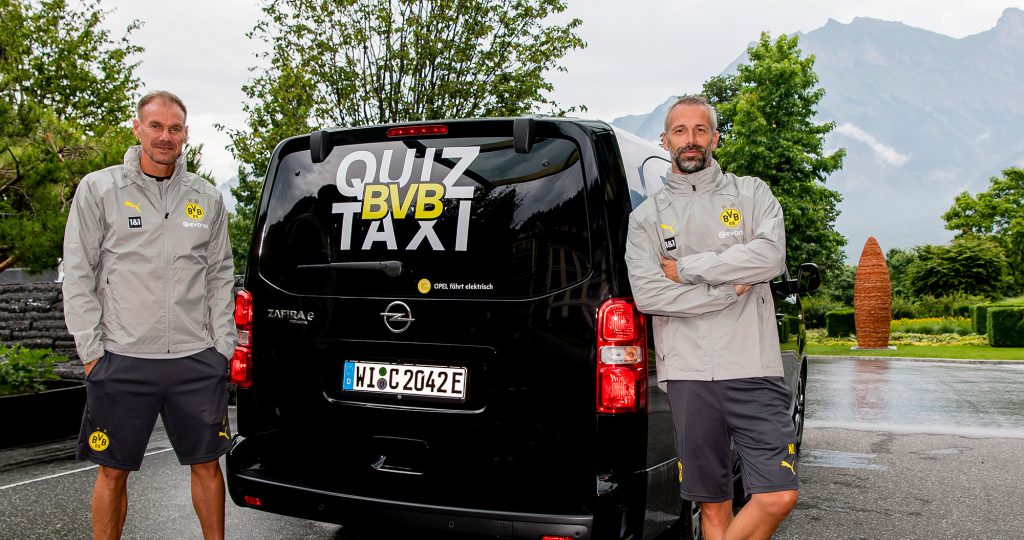
Environmental and climate protection are also becoming increasingly important in sport. This is particularly true of professional football, as its associations and clubs are in the spotlight of an increasingly critical public more than in other sports. Two examples alone show that this cannot just be about green image cultivation, but that there is an urgent need for action: according to UEFA, more than 2.8 million tonnes of CO2 were emitted during the 2016 European Football Championship in France. That corresponds to about 2.6 million round-trip flights from Paris to New York. And years ago, Deutsche Umwelthilfe (German Environmental Aid) found that 11.5 million disposable cups were produced in stadiums in one season of the German Football League alone.
Association initiatives
The German Football League (DFL), the association of the 36 clubs in the 1st and 2nd Bundesliga, recently sent a clear signal for more environmental protection by deciding to include sustainability as a criterion when awarding licences in future.
The Bundesliga and 2. Bundesliga are the first major professional football leagues to include sustainability criteria as mandatory in their licensing regulations.
From the minutes of the DFL General Meeting of 14.12.2021
The number of clubs submitting environmental reports and employing CSR officers is steadily increasing. The reasons for this are, on the one hand, the aforementioned licensing requirements, but also the fact that demands for more sustainability and social commitment are increasingly being made at general meetings. And last but not least, critical reporting by the media is increasing the pressure on clubs to act.
However, not only the German Football League, but also the German Football Association (DFB), which is responsible for the 3rd division, the amateur clubs and the national team, would like to encourage the clubs to show more social and ecological commitment. One example is a catalogue of ideas listing 87 individual measures.

The association itself has also set up a sustainability management system, the responsibility for which lies with the DFB Vice President for Social and Societal Policy. He is advised and supported by the Social Responsibility Commission, which is made up of representatives from the regional and state associations as well as other sporting and social associations and organisations. The concrete processing of topics takes place in the various working groups. In addition, the DFB signed a declaration of commitment to the United Nations’ “Sports for Climate Action Framework” in January 2020, thus giving the go-ahead for a much stronger commitment in this area.
Clubs become active – examples 1. FC Köln and Borussia Dortmund
There is already a lot happening among the clubs in the Bundesliga. These include VfL Wolfsburg, Bayer Leverkusen, TSG Hoffenheim, SC Freiburg, VfB Stuttgart, FSV Mainz 05 and 1. FC Köln. The latter are even striving to become pioneers in the professional league in terms of sustainability. The Cologne club was the first Bundesliga club to obtain a certificate according to the sustainability standard of the Centre for Sustainable Corporate Management (ZNU) of the University of Witten/Herdecke. For the successful certification, the 1st FC had to prove measurable achievements in the areas of environment, economy and social affairs on the basis of 44 individual criteria. Numerous aspects – from water consumption in pitch maintenance to the teaching of values in the junior teams – were examined. A cross-departmental sustainability team consisting of more than a dozen FC employees worked for more than seven months to achieve the successful certification. The multi-stage certification process by TÜV Rheinland Cert included testing sessions at the Geißbockheim, the sports boarding school and the fan shop. The ZNU standard also includes that the FC’s sustainability progress will be checked annually in the future.
Borussia Dortmund (BVB) is the first Bundesliga club and the second European football club ever to sign the United Nations Global Compact. The UN Global Compact (UNGC) is the United Nations’ voluntary business initiative for sustainable and responsible corporate governance. By joining, the club promises to align its strategy and activities with specific principles. Ten principles include respect for human rights and international labour standards, environmental protection and anti-corruption.
There is only one planet where we can play football.
BVB Managing Director Hans-Joachim Watzke on the relevance of sustainable trade
BVB began preparing an annual sustainability report years ago and presenting it at a press conference. Announcing measures that are intended to contribute to a positive image of the club is one thing, but implementing them and communicating them transparently is another. It is obvious that this cannot be a success story in all areas. “Not perfect, but better” is the sustainability motto of FC St. Pauli.
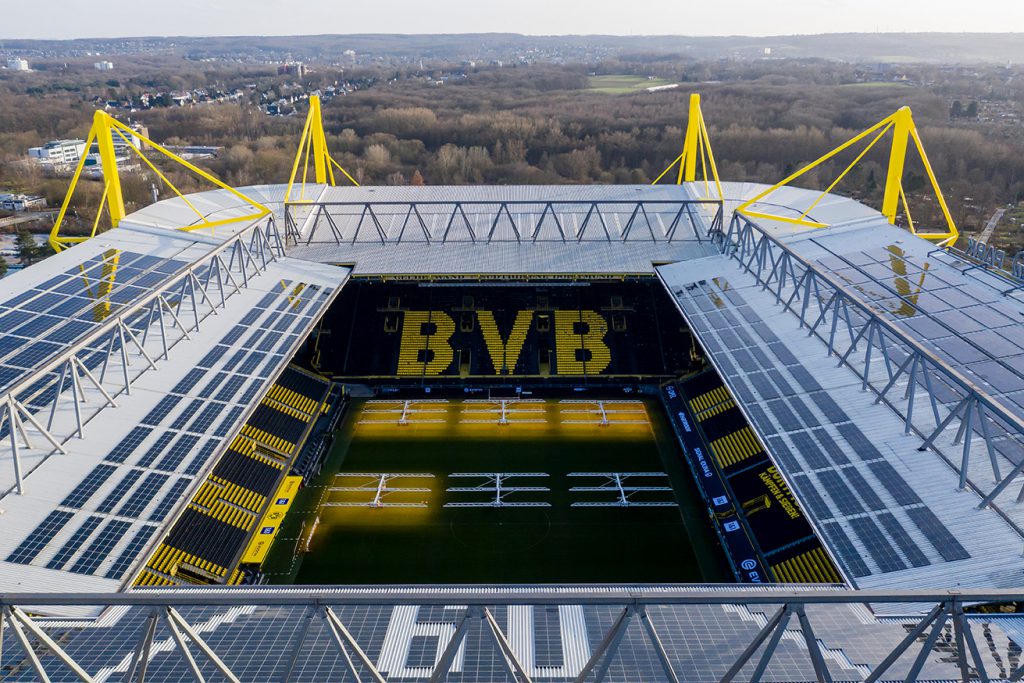
Example RB Leipzig
Only recently, RB Leipzig also presented its new sustainability strategy. With the newly created business unit “Sustainability & International Development”, which has been in place since January 2022, the club is taking on environmental responsibility. The Bundesliga club underlines the importance of the topic by having the department report directly to managing director Johann Plenge, who has been responsible for strategy and corporate development since the beginning of the year.
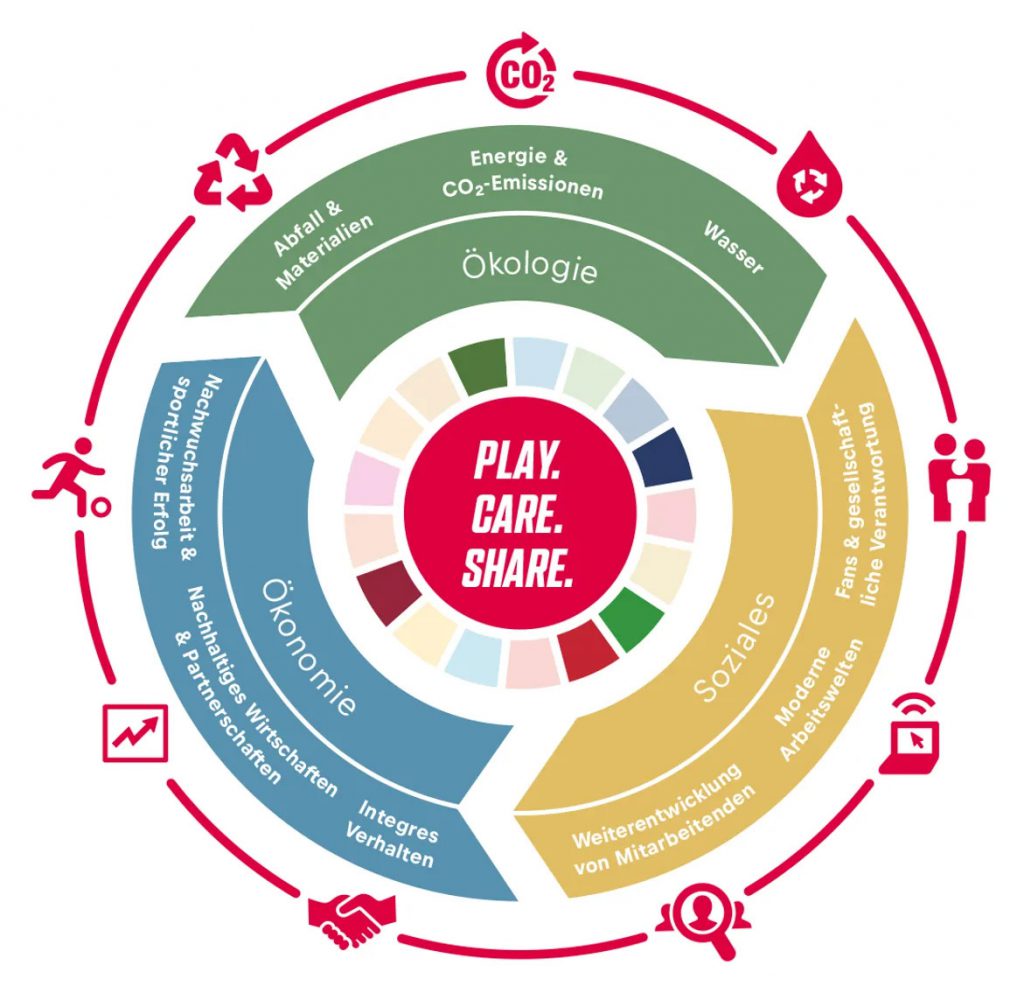
According to RB, “the integration of sustainable thinking and action is to run through all business areas and produce new forms of cooperation”. The bundle of planned activities includes numerous individual measures, whereby the offer of “veggie food”, i.e. vegan products offered to fans during the game, is particularly eye-catching. The club cooperates with the company “Veganz” and thus shows “that vegan food is also a part of the stadium”. Remarkable: the vegan bratwurst and vegan currywurst are offered at the same price as the meat products.
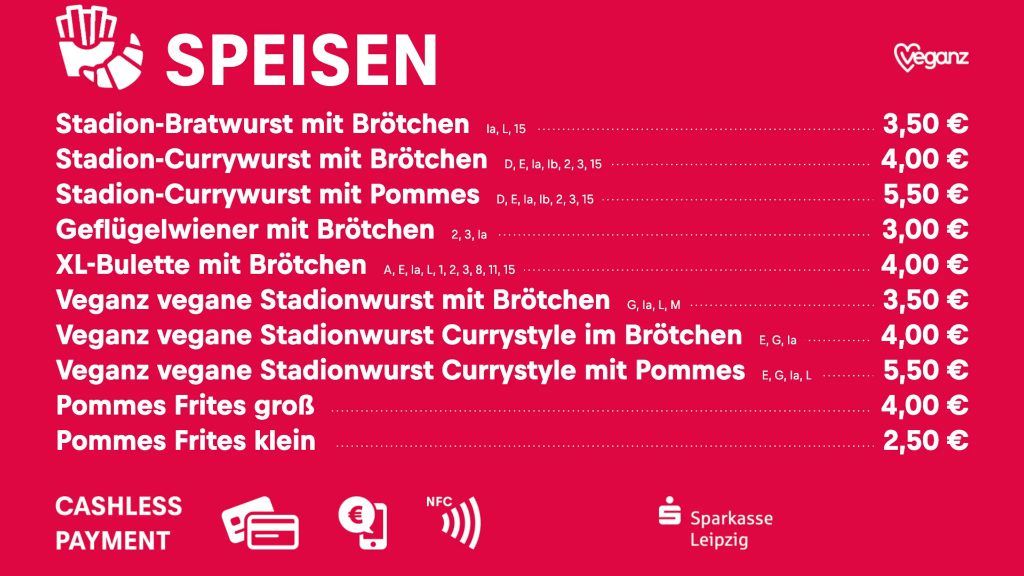
In the field of ecology, three essential topics were defined that are consciously pursued within the sustainability strategy. Within these topics, there are already some measures that have been addressed. These include, among others
- Determination of the CO2 footprint with the aim of a gradual reduction
- Implementation of energy management according to ISO 50001
- Avoidance and reduction of plastic (especially disposable)
- Vegetarian and vegan meals for athletes and employees
- Conversion of the RBL vehicle fleet to hybrid and e-vehicles
- Expansion of the e-charging infrastructure
- Support of climate-friendly mobility for fans and employees, e.g. job tickets, free offer for the use of public transport with the RBL tickets, “JobRad” for employees
- Mobile ticketing
- Switch to digital information formats for fans
Special measures in the arena
- Change to LED floodlighting
- Vegetarian and vegan food options
- Deposit cup system
- choice of regional partners and service providers
- Bicycle garage for fans and VIP guests on match day
- Public catering: all packaging made of recycled material
- Organic sweets and organic soft drinks
- Water-saving toilet systems
- Passing on old stadium seats to local clubs and recycling of old seats (in cooperation with Leipzig University)
- Joint project “SEATainability” with the Leipzig University of Applied Sciences (HTWK Leipzig)
Example FC St. Pauli
The Hamburg cult club wants to become climate-friendly as soon as possible. The club announced: “Against the background of its economic and social responsibility, FC St. Pauli defines sustainable action as a core theme of its future orientation and sets the course for climate-friendly decision-making.”
FC St. Pauli set out on the path to more sustainability back in 2016 after a motion at the general meeting that merchandising should be produced fairly and sustainably in future. This was soon followed by a first sustainable skull and crossbones collection, its own jersey and its own sports collection. The fact that these measures were carried out consistently and transparently can also be seen in the publication of “Cum Ratione – Gesellschaft für Aufklärung und Technik”, which documents the results of an analysis of the environmental friendliness and social compatibility of the clubs’ fan shop articles. Here, the Hamburg clubs landed in the top 5 of the ranking. The front-runners here are the “Eisernen” from FC Union Berlin. A summary of the results of the study can be found here:
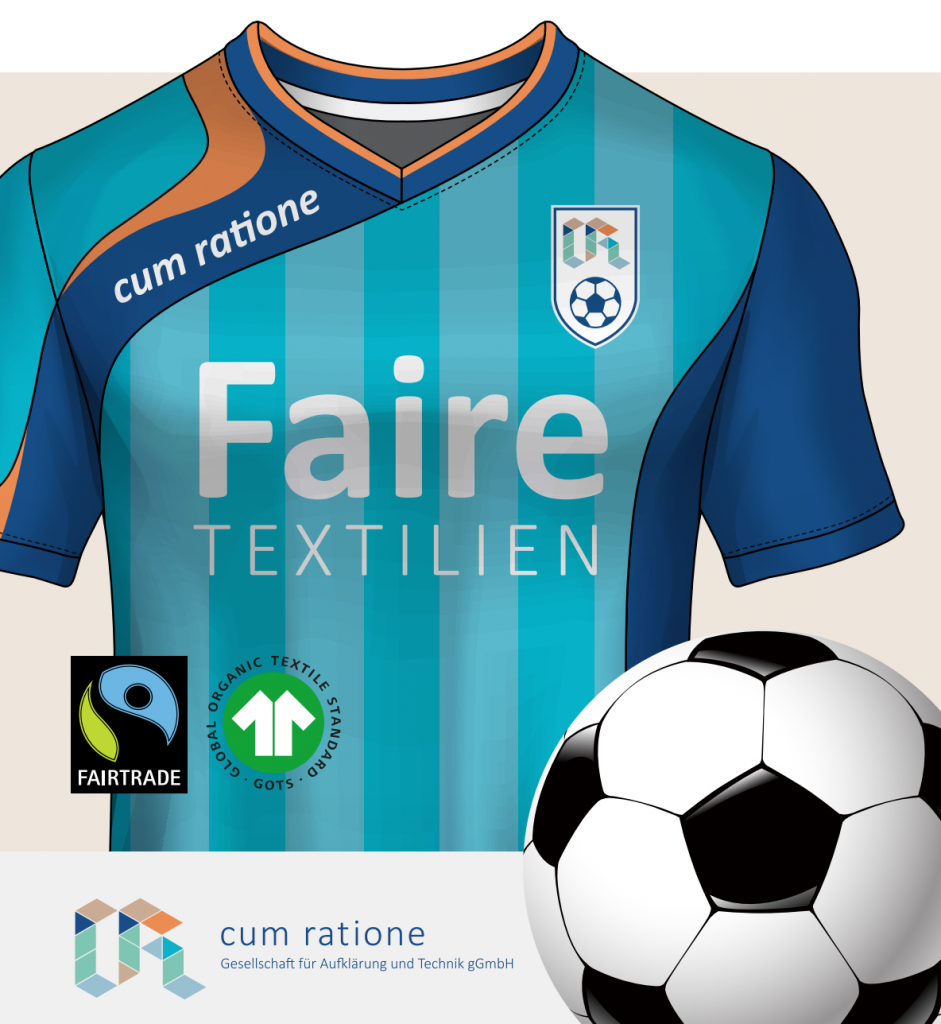
https://www.cum-ratione.org/wp-content/uploads/cumratione_Praesentation_DIGITAL.pdf
In the autumn of 2020, the club finally began to deal more intensively with this complex issue. Together with five other Bundesliga clubs, the club underwent sustainability certification by sustainClub in a pilot project. In addition to the results of the sustainClub analysis, other certification systems such as the German Sustainability Index or the Common Good Balance Sheet were also taken into account in an initial stocktaking.
On this basis, a conception process was started in which a total of 51 people in several working groups, in addition to full-time employees of the club, also fans and members have worked out goals and milestones for FC St. Pauli. It is important to the club “that this process is always carried out transparently and with the involvement of members, employees, fans and partners of the club. It is essential for this that progress will be measurable in the future”.
There is still a lot to do!
Some of the environmental measures of professional clubs are still only on paper, and some clubs are still not addressing the issue of sustainability. As our best practice examples show, however, a blanket accusation of ignorance or greenwashing against the clubs would be inappropriate despite all the implementation deficits. In the future, central elements of a life cycle assessment or CSR certification should particularly include areas related to climate protection – and currently – to reducing dependence on imports of fossil fuels: Mobility and energy. According to the Öko-Institut, for example, fan mobility accounts for around 60 to 80 per cent of a club’s total carbon footprint. Werder Bremen, for example, shows how this can be tackled with a mobility concept that even allows spectators to travel to the stadium by rental bike or ferry. And SC Freiburg, already a shining example in terms of sustainability, also encourages its fans with attractive offers not to travel by car.
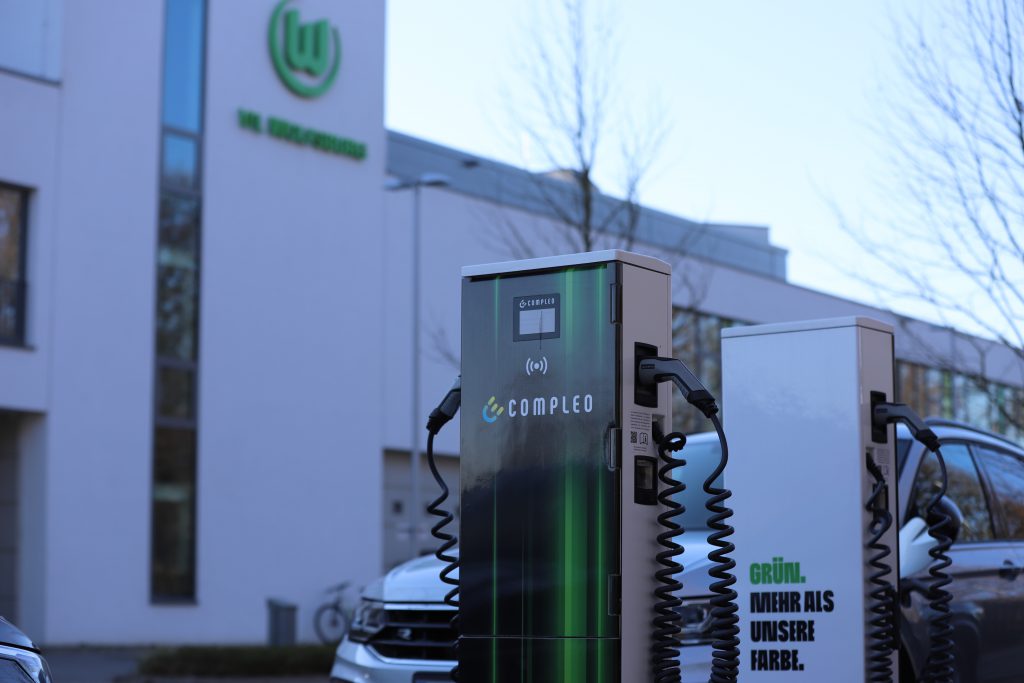
Sustainability Special of “Stadionwelt”
What else is going on in terms of sustainability in sport and especially in the football business can be read from May onwards in the SUSTAINABILITY special of the magazine “Stadionwelt”. It deals with topics related to climate and environmental protection in stadiums and arenas. It offers approaches and measures relating to sustainability, presents individual projects and gives those responsible a chance to speak. The publication offers definitional approaches with regard to sustainable action and covers the complete range of topics: Sustainability in the planning and construction of sports facilities, in the area of equipment and infrastructure – or with regard to the various management disciplines.
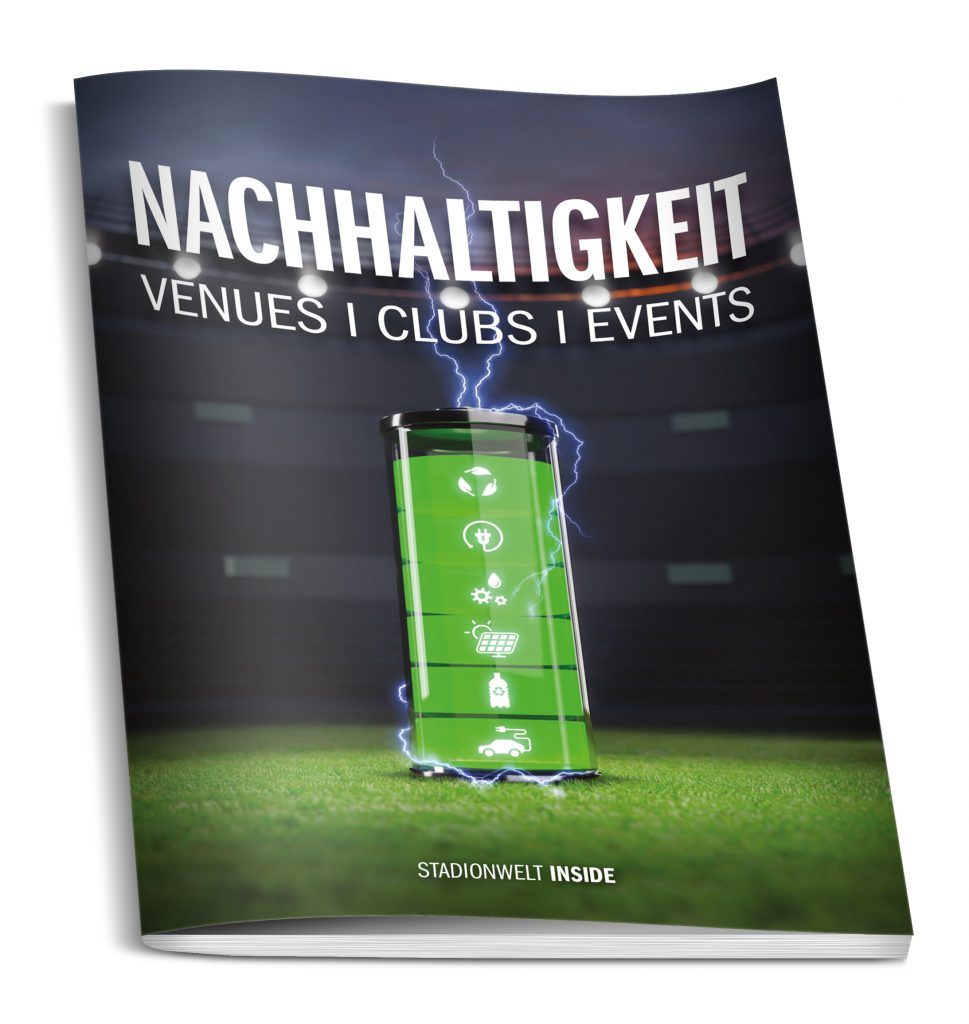
On 7 April, in episode 2 of our series, you will find out how clubs are addressing the electrification of their fleets.
Text: Peter Grett
Images:
Lead story: Opel Automobile
Image 1: DFB
Image 1: Borussia Dortmund
Image 2: RB Leipzig
Image 3: RB Leipzig
Image 4: cum ratione
Image 2: Volkswagen
Image 5: Stadionwelt
Links:
https://www.dfb.de/umwelt-und-klimaschutz/umweltschutz-im-verein/ideenkatalog/
https://unfccc.int/climate-action/sectoral-engagement/sports-for-climate-action
https://www.deutschlandfunkkultur.de/nachhaltigkeit-im-sport-fussballvereine-machen-sich-100.html
https://www.stadionwelt.de/news/31930/fc-st-pauli-stellt-weichen-fuer-nachhaltiges-handeln
https://www.cum-ratione.org/wp-content/uploads/cumratione_Praesentation_DIGITAL.pdf
https://www.stadionwelt.de/news/36648/stadionwelt-veroeffentlicht-special-nachhaltigkeit



